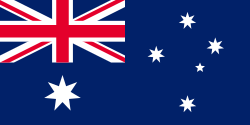| Australia in the Junior Eurovision Song Contest | |
|---|---|
| Junior Eurovision Song Contest | |
 | |
| Participating broadcaster | Special Broadcasting Service (SBS; 2015–2016) Australian Broadcasting Corporation (ABC; 2017-2019) |
| Participation summary | |
| Appearances | 5 |
| First appearance | 2015 |
| Last appearance | 2019 |
| Highest placement | 3rd: 2017, 2018 |
| External links | |
| Australia's page at JuniorEurovision.tv | |
| Australia in the Junior Eurovision Song Contest 2019 | |
Australia has been represented at the Junior Eurovision Song Contest five times between 2015 and 2019. Special Broadcasting Service (SBS), an associate member of the European Broadcasting Union (EBU), participated at the 2015 and 2016 contests, with the Australian Broadcasting Corporation (ABC) taking over from 2017. SBS previously broadcast every edition of the Junior Eurovision Song Contest on a delay.
Contents
The first representative to participate for the nation at the 2015 contest was Bella Paige with the song "My Girls", which finished in eighth place out of seventeen participating entries, achieving a score of sixty-four points. Australia continued their participation at the 2016 contest, having internally selected Alexa Curtis with her song "We Are", which finished in fifth place, scoring 202 points. Isabella Clarke in 2017 and Jael Wena in 2018 both placed 3rd, Australia's best results to date. After finishing eighth with Jordan Anthony in 2019, Australia announced their withdrawal from the 2020 contest due to the COVID-19 pandemic. The country has not returned to the contest since.

